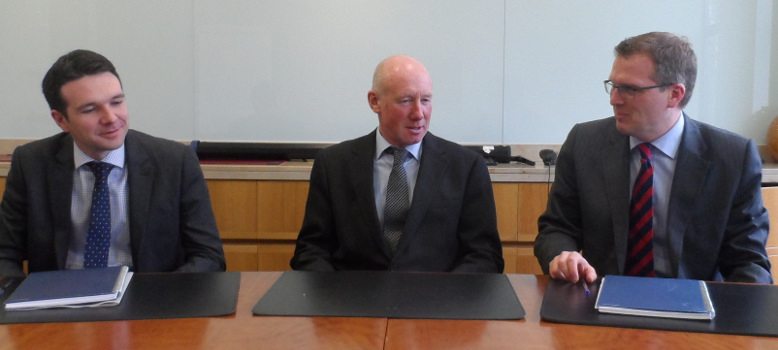Policy Uncertainty May Be Fueling Solar Energy Bubble

Government and State Agencies must develop a clear strategy for solar development in Ireland writes James Murphy, IFA Renewables Project Team Chairman.
There is currently a positivity around solar energy production in Ireland, which is reminiscent to the optimism around the ill-fated miscanthus plans of a number of years ago. This is a reason to be concerned, particularly as over 5,000 acres of farmland across the country is currently under some form of solar contract.
Pictured above: IFA makes the case to the CER for grid access preference for community energy projects. Left to right: Robert O’Rourke, Manager of Energy Network, CER, James Murphy, and Eamonn Murtagh, Director of Energy Networks, CER.
This situation exists despite the fact that Government has not yet announced a required price support or tariff and the Commission for Energy Regulation is currently reviewing the process for accepting solar projects onto the grid infrastructure. In addition ESB has collected several million euros in grid connection applications.
But it does not stop there. Solar development companies are continuing the march across parts of the country where the level of solar energy to sustain a project is questionable. This speculative calling to farmers by development companies, combined with the policy uncertainty, is a real cause of concern. It may fuel a solar bubble and farmers’ legitimate expectations may be left undelivered.
A clear national solar strategy is urgently required. This strategy must provide certainty for all impacted, most particularly host landowners who facilitate the projects and communities that live in the vicinity of proposed solar projects.
Communities must be involved.
Under planning law, all development companies must be obliged to actively engage with communities. No applications should be accepted by any planning authorities unless they clearly state that communities in the vicinity of a proposed project have been consulted and engaged with. This community involvement must happen before the planning application is lodged.
These same communities must be at the centre of future renewable energy developments. This means that to be eligible for state financial support all large scale energy development companies must offer at least 25% of each project for community ownership, once built out. In addition, each year at least 1% of the turnover from these projects must be invested back into local communities to support rural regeneration and employment.
Policy must be clear and support community participation
The current vacuum has to be addressed urgently. The Department of Energy, ESB and the CER must put in place the following policy measures to support community projects: a 2.5c/kWh tariff premium, grid exemption and a community quota – whereby at least 25% of any new renewable scheme is ring fenced for community projects that have at least 25% community ownership.
Government and all the State agencies that support the delivery of solar policy in Ireland need to come forward now with a clear policy framework, which ensures farmers who sign exclusivity or option or lease solar energy contracts have a realistic prospect of the projects happening and that they do not needlessly allow their lands to be tied up. Communities also deserve the certainty of knowing what renewable projects may or may not happen in their local communities.




